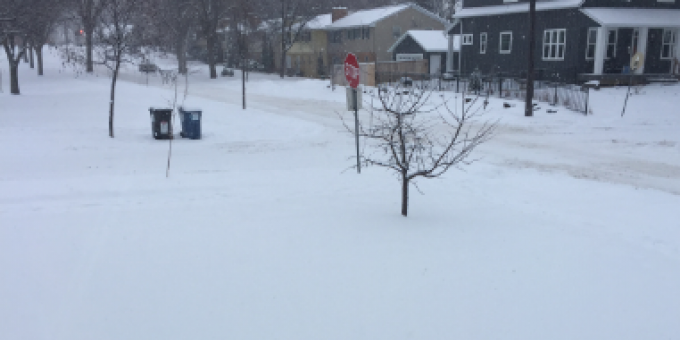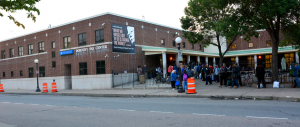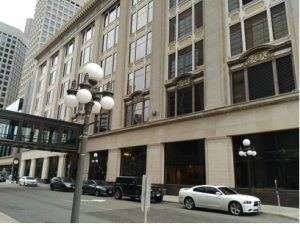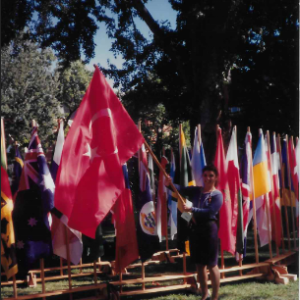
Today, The Society Pages reposts this original essay, written last summer as part of the Wonderful/Wretched series. Wonderful/Wretched is a collection of twenty-one essays on the racial dynamics of the Twin Cities written by social scientists with ties to the metro area in response to the killing of George Floyd. Wonderful/Wretched has since been revised and expanded in a published volume, Sparked: George Floyd, Racism, and the Progressive Illusion available through the Minnesota Historical Society. For the remainder of the summer, in celebration of Sparked’s publication, and in reflection of the year that has passed since last summer’s historic uprising for racial justice, The Society Pages will repost essays from Wonderful/Wretched in their original form.
As evil goes, racism’s greatest power is its ability to evade being named, its definition debated ad nauseum while its insidious impact is felt with the force of a blow, out of nowhere, feared, experienced, but denied, and the more shattering for it.
It’s in your head. It’s not your race, it’s you. You’re imagining it. You’re the problem. Toughen up.
And, then, there is Minnesota, but I’ll come back to that many times over, I promise.
I was born a girl child, the first of many disempowering labels to be placed upon my shoulders, to a devout family in Turkey. As a religious privilege of his gender, my paternal grandfather got to whisper into my right ear my name and a prayer, Özlem, a “yearning.”
Özlem, a longing without bounds, crushing to the bone if you let it, in exile from one’s deepest loves and desires, synonym for homesick. Both the yearned for and the one yearning.
A name foreshadowing of an othered existence – woman; of some other faith; immigrant; party to a language-discordant marriage; presumed transgressor of others’ lanes; “primigravida at advanced maternal age,” a scientifically arbitrary, and socially ominous marker that throws one forever out of sync against the “per usual” life stages of her birth cohort.
Othered through and through even in motherhood, out and over again.
In moments of solitude (and those are many, stay-at-home orders only the latest excuse), my soul seeks comfort in the recitation of names: of my children in silent gratitude; of beloved pets, now gone; and always, but always, Minnesota, the name I’ve given to “home” that no other address in nearly five decades of living on two continents has come close to claiming.
But other names sneak into the quiet moments and rattle up this reverie of Minnesota.
Özlem, say their names.
Jamar Clark. Say their names.
Philando Castile. Özlem, say their names.
George Floyd.
And, Alex Kueng, yes, him, too – the mixed race, rookie Minneapolis police officer on only his third shift on the job. As testament to his character, friends and family claim he joined the force with the ambition of reforming it from within. An irony of unbearable tragedy, if truly so. Malice, neglect, fear of authority. Whatever pushes one into silent compliance, his is another life shattered either way. Say their names.
Names breathe life into things, make them visible, and shift perceptions in subtle and not-so-subtle ways. Unearned privilege, virtue signaling, police brutality, allyship, intersectionality…
What name would I give to my two decades in Minnesota, now nearly a decade in the past?
Memories rise up that complicate rather than clarify.
I arrived in the Twin Cities to attend Macalester College, a bastion of selectivity that cloaked its elitism behind Hippie chic and Birkenstocks. I learned within weeks new names for new identities – bleeding heart liberal, granola head, student worker, full-ride student. The latter was not a badge of honor – lacking the means to pay for college doesn’t bestow any bragging rights – but merely the context for my experience. “First generation” had not yet made its way into woke higher ed lingo to have reached my 19-year old consciousness.
First solo task of orientation week? Get yourself a social security number. My initial impression of race in Minnesota was bewilderment at arriving in mid-day St. Paul, the capitol city, to deserted streets, save for a large group of dejected-looking people, a mix of race, age, and gender, milling about the Dorothy Day Center.

Before sending me off on this bureaucratic mission, no one had explained to me – a fresh new international student less than a week in the U.S. – about the skyway system built to shelter its charges against the harsh elements of the frozen tundra, and, in offering protection to some, hiding entrances from others. I did notice the elevated tunnels up above with smartly dressed people hurrying across in decisive steps, clearly with some important work ahead. With no other point of reference in my personal history, I ignored these quintessentially Minnesota structures as irrelevant to my search.
As I wandered the streets below, alone, from one empty block to another, looking for the entryway to the Social Security Administration building, I wondered where everyone else was on this work day. The elusive door to a government building, an architectural metaphor for access, how about that.
The lucky few floated over the streets in climate-controlled comfort while the less fortunate and downtrodden needlessly suffered the late summer heat in front of a homeless shelter. Yet another architectural metaphor, this one for privilege in Minnesota, if there ever was one.
Must failures of a system be experienced as a personal weakness?

Four years later, I graduated from the expensive cocoon of Macalester into the arms of a Black man, neither of us the “darker berry” or the “White trophy” as society is wont to trivialize, sexualize, and reduce interracial relationships to a fraction of their essence. He wooed my heart with sweet laughter and music, and gave me a new name.
From the moment they met me, his extended family took me in with abundant acceptance. Yes, family! There was an instant recognition of similarities, of wholly fitting in, that I had not yet experienced in Minnesota or perhaps ever. From the ways they expressed affection to the foods they prepared in love, from their unreserved humor to their cynical optimism, they were more Turkish than what I had come to see at Macalester as being American, the alluringly welcoming, yet aloof Minnesota-nice that’s not always so. With his family – my family – I felt among my people. Breathe.
I don’t condone Rachel Dolezal’s actions. The deception was damaging. But I think I understand. How wrong am I for admitting that?
Seemingly out of nowhere, being in relationship with a Black man and his family imposed upon me an immediate identity of “whiteness”, a label I hadn’t had to carry at Macalester, higher education’s facsimile of Noah’s Ark, where I had not been White per se, but merely one of a raceless cadre of international specimens brought to these shores for the enrichment of someone else’s education. Middle Eastern, at times, “Isn’t Turkey in Europe?” occasionally, but definitely rarely, if ever, White – whatever White is. For, you see, whiteness had not been the identity Macalester had needed me to perform in exchange for the free room and board, and tuition.

It took a single date with my Black beau for Özlem, the recent Mac grad with the unpronounceable name to become in the eyes of others Özlem, the White woman consorting with a Black man. A pairing, I would find out soon enough, of the highest discomfort-inducing kind in Minnesota, a visually appalling and vocally (and loudly) criticized offense for Black and White spectators alike.
Quickly, he educated me on the parts of town where we could be seen together, and where we best not. He told me of places he felt safe, and places where KKK had a presence, and clues to tell them apart. For our first home together, we stayed away from Black neighborhoods because they spelled different kinds of trouble for me, him, and us both.
When Black women (and, not once a Black man) rolled their disapproving eyes at us with an audible “ain’t that a shame?” I feared being the wrong color to love him. He countered my newly-adopted insecurity with an emphatic denial of my whiteness – you’re not White, Pookie, you’re not, he reassured me, just look at your kinky-ass hair. I shivered in his acceptance.
Call me my new name. Say that I belong.
Our first experience with the police was an introduction of sorts. We were traveling on I-35 to a family reunion in Iowa. The second that we crossed the border, we were pulled over for going over the speed limit. I know you were trying to pass a truck, the officer said, beating us to an explanation, but, still, you were speeding. Traveling alone, I have never been pulled over on that road again, and it ain’t for observing the speed limit, either.
As we got back on the highway, he taught me the name for my new experience – driving while Black.
Naming things makes them visible.
Our second encounter with the police – again traveling south on I-35 – was more serious. We got pulled over for having expired license plates. I don’t recall that they were. And, suppose we did. How would they have noticed from their vantage point parked facing the road? He was handcuffed and sent to jail for an unpaid parking ticket we did not know he had. That night, I learned the name for yet another way that racism feeds its capitalistic hunger – bail.
In every relationship, one person is always more powerful than the other, he had taken to reminding me by then; I am the more powerful in ours.
Our third experience with the police proved to be terrifying. As they hauled him away, I begged them to let him keep the medication that his life depended on. “You can drop it off at the jail” was the cold-hearted response as they pried the precious medicine from his hands. Mama. I can’t breathe. There was no discussion to be had, no mercy to be spared.
In every relationship, one person is always more powerful than the other. I am the more powerful in ours.
In that instant, I caught a glimpse of the injustices he had been tallying for my benefit. I felt I could forgive him the smoldering anger. The establishment was after my man, and I was going to defend him. Primed at birth in a foreign land to be a helper. Woman, enabler, immigrant, ally, race. It’s a jumbled mess.
I wasn’t present for the fourth encounter, and it is his story to tell anyway.
Our love and care for each other were ultimately crowded out by the tentacles of racism, and the daily grind upon two young people trying to create a sense of normalcy where little of it exists for interracial couples. Now decades and hundreds of miles away, I am no closer to being at peace with my reaction to the treatment (his of me, mine of him, of him by the police, and of us by Minnesota) than I am of having been denied the convenient narrative of a starter marriage, or the seven-year itch that society otherwise allows same-race couples in the heat of divorce.
What name do you give to a relationship blown to smithereens by past and present racism? What do you call that brand of heartache?
Once we were out of each other’s lives, I went back to graduate school first at University of St. Thomas, then at University of Minnesota. I joined a social group for “transplants,” and found comfort in commiserating over the impossibility of breaking into the social circles of the native-born in Minnesota. For the most part, I was free now to turn a blind eye to both race and racism in my new little cocoon. At St. Thomas, I don’t recall a single non-White classmate; I was “diversity”, the “international perspective” in class discussions. At University of Minnesota, I had more classmates from other countries than I did African Americans. I was a well-educated, highly skilled, high-tax bracket model immigrant. On my own, I was allowed to pass. Life was uncomplicated once again. Resume breathing.
Naming racism is our best hope of banishing it. But that requires education, awareness, deliberate effort. Courage. For a bit there, I served as a teaching assistant for a course in education, tasked with grading stacks of undergraduate writing. Tell me there is a special place in heaven for that. Toward the end of a particularly strenuous semester, I found myself in the middle of a reprimand; a student had claimed I had made a racist comment, and was appealing their score on a paper. Me, the ex-wife of a Black man, the one-time sufferer of racism, herself a racist? A Black student had taken offense, I was informed, to my admonishment to “please use proper English” – a comment I had written on many papers over that long semester, oblivious to the historical layers of racial shaming and diminishment piled upon it. In a tone of nonchalance and without the slightest attempt at context, I was told to “not do it again because people are sensitive to that kind of thing.” I remember asking – with no small amount of indignation in my voice – how else to communicate the need to write clear sentences that obeyed the rules of grammar, to which the response was to “say please use standard English.” These two sentences remained the sum total of mentoring I received on race, diversity, inclusion, or belongingness at the R1, land-grant, flagship institution of the state of Minnesota.This is not some ancient history, mind you.
Allyship is not for the faint of heart or the insecure. I have seen it (experienced it!) become an othering experience for both parties involved. As one side pushes to help – let me infantilize you further, you are weak, the other side pushes back for air – don’t use me for your own gratification. You have no idea, don’t presume. In indignant counterpoint yet, the ally protests but my self-image is at stake, I must be seen as helping. How dare you push me away?
I had an encounter with a Black student recently, an undergraduate, overextended, overcommitted, falling behind. Their Greek house lacking pledges, they were engaged in a herculean effort to do it all by themselves. The solution was screamingly obvious; we, the elders, know all undergrads suffer from poor time management skills, right? “You can do all that other stuff once you have your degree,” spoke the wise one, “give the Greek stuff a rest. Focus on your classes instead.” The student looked at me with a mix of deep disappointment and exasperation. “You don’t get it,” they said, “You don’t understand how much I need my brothers and sisters to survive in this place. Of course, you wouldn’t understand, you’re White.”
Am I White or something else altogether? An ally or the one who needs allies? What is the name for me?
Since Minnesota, I’ve lived in Indiana, Virginia, and, now, Illinois. In 30 years of life in the U.S., I have referred to myself as a “woman of color” a total of one time. I had been invited to interview for a leadership position at a public institution back east. The position had been vacant for some time, and, judging by publicly available information, I suspected compensation might have been an issue. I shared my concern with the search chair – no need to waste anyone’s time – but she insisted I had nothing to lose – just come check us out, we are only a few hours away. So, I demurred.
The last item on the itinerary was a meeting with direct reports to the position, a mix of chairs, directors, and administrative staff. Once the initial pleasantries were dispensed with quickly, the White men in the drab room made it apparent how they felt about the prospect of working for someone like me; in a show of practiced aggression, they impaled me with pitch-forked questions laced with a Southern drawl weaponized to inflict harm. Imposing in their physical girth, they lobbed pointed comment after pointed comment thinly veiled as questions as smug looks of satisfaction crossed their faces. As I tried to maintain my composure, I searched my brain – in painfully small motion – for the proper name for the fear and anger rising within me. At last, my brain offered up a feeble suggestion – in this space, it said, you are a woman of color. It was not a name I had ever associated with my lived experiences, but the closest phrase I could grab in desperation to describe the experience of terror and agony for being the wrong color for the company. The body knows what the mind struggles with.It’s in your head. It’s not your race, it’s you. You’re imagining it. You’re the problem. Toughen up.
While all the fibers in my body screamed “get us out of here!” my escort – a White woman – insisted on an impromptu tour. She said she wanted me to see a bit of the campus before I hit the road, and the daycare center where my babies could be cared for. Then, in between buildings, she offered her confession for my absolution. “There is a good old boys’ network here,” she said. “They treat me like that, too.” So, she had noticed. And chosen not to intervene in the moment. “We need more women,” she said, “more women like you.”
In years of campus interviews in academe, that place remains the only one – EVER – to fail to communicate a final decision. The boys had spoken with their silence.
Belonging is touchy, no matter where one goes. A few years back, I was at another interview, this time at a small regional college “up North”, with a beautiful, lakeside campus tucked away in the Northern woods in Native American country. In an attempt to establish rapport, I mentioned I had lived in Minnesota for 21 years (hey, I am one of you!) to which, and without the slightest hint of cruelty or irony in their voice, someone slapped back with “No, you haven’t lived in Minnesota, no, no. You’ve lived in Minneapolis. That’s not Minnesota. This is Minnesota.”
Özlem, no, a thousand times no, do not let this become an elegy. I am not prepared to let go. Neither White, nor Black, certainly not allowed to be of this country. For if not in Minnesota, where else can I rest?
Being othered through the phrase “in this country” is a frighteningly common experience for those in marginalized groups. It is not always in the form of a chastisement, either. My latest “in this country” encounter happened shortly after moving to Illinois when a new colleague was telling me about a rather mundane and common activity. It might have been as innocuous as eating apple pie or watching Sesame Street as a kid, the details are not important. “You may not be familiar with it,” they said with a helpful smile, “that’s what we do in this country.”
The worst kind of othering is the one inflicted with a smile because it demands a smile in return. Rightful indignation denied.
Will my one-time Black family remain the only ones to have embraced me? Will I ever again belong?
Minnesota… the place to which I will return. If not now, I tell myself, then in retirement.
Minnesota… the place I look upon with the soothing hope of finding my people once again, of belonging. Minnesota. Minnesota.
At my most sentimental, I miss hearing the names that softened the shame of not belonging. To be beautiful again. Thick thighs, kinky hair, lowrider booty, it’s all good. You’re not chunky, Pookie, you’re big bone-ded. You’re built strong.
The heart of an immigrant aches insatiably, stuck somewhere between once upon a time and never. Minnesota, the presumed salve for mine. Allah has 99 names, and remains unknowable yet. What chance do I stand?
Özlem. Solitude. Soul. Bless me with a name. Minnesota.
Charleston, IL
July 5, 2020
Return to the Wonderful/Wretched Series introduction.
Link to purchase Sparked: George Floyd, Racism, and the Progressive Illusion
